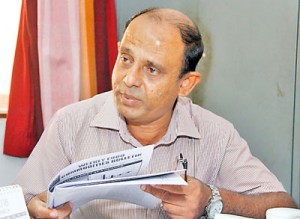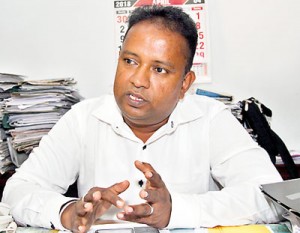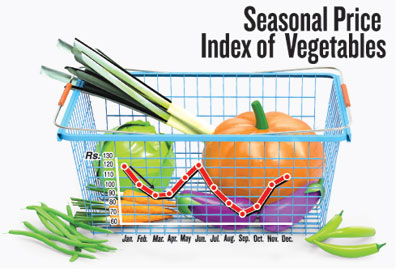News
Veggie farmers cry out for sales channels for their surpluses
Every year, Sri Lanka’s farmers produce some varieties of vegetables more than is needed by households. Only minute amounts are exported. The bulk ends up on garbage dumps, for elephants to rummage through.

Dematagoda market: Vegetables galore. Pix by Indika Handuwala
The glut of vegetables cause financial loss to farmers and the waste of thousands of tonnes of vegetables continues.
Farmer associations are calling for ways to regulate agricultural production.
Vegetable prices in Colombo dropped sharply with the majority of produce selling below Rs 80 per kilogram.
Referring to the recent glut, Duminda Priyadarshana, head of marketing food policy and the agri business division at the Hector Kobbekaduwa Agrarian Research and Training Institute said farmers had switched to growing vegetables because they had not been able to grow rice.
He said demand and supply fluctuates from March to April and July to September, but this year’s surplus has led to a massive drop in prices.
Mr Priyadarshana said farmers can harvest their vegetable crop in 45 days, unlike the rice crop. Despite losses, he said, farmers continue to grow vegetables, in the hope they can recoup their money the next time around, but it does not happen. So they sink deeper and deeper into debt.
Mr Priyadarshana told the Sunday Times that the Agriculture Ministry and the training institute should draw up plans to manage production and regulate prices.
A researcher at the institute, W A Nalaka Wijesooriya, said a system under which they suggest the amount and type of crop based on the size of the farm had been introduced. But this can not be implemented because of adverse weather. For one thing, the Government has no system to purchase excess stock and store them.
At the same time, he said, farmers are reluctant to follow available schemes.
But farmer groups blame the Government for not helping them in marketing their produce.

W A Nalaka Wijesooriya

Duminda Priyadarshana
The All Island Farmers Federation. national organiser, Namal Karunaratne told the Sunday Times that the Government lacks a plan to regulate crop production and estimate how much is needed for consumption.
He also said, that the Government must provide suitable seeds.
Mr Karunaratne said farmers produce 100 kilos of vegetables and only earn an income for 40kg.
The lack of air-conditioned storage contributes to the waste. Buyers in Dambulla do not have such storage either.
“Sometimes, farmers have to pay more to transport vegetables compared with what they can earn,’’ Mr Karunaratne said.
Back in Colombo, vendors said they are unable to sell their vegetables despite a drop in prices.
“Though the prices have dropped, there is no major increase in demand. Some times we buy extra assuming that we can sell it, as prices are low, but that does not happen,’’ said M. N. Nirmala a vendor at the Dematagoda market.
She said she incurs losses as a result.
Sumith Thilanka, another trader in the same market, said many of the vendors were selling the same produce.
“Due to large stocks being transported, the crop damage also was high. This further affects the traders,’’ he said.
He sees the need for cold storage facilities in markets.
A cross section of consumers interviewed by the Sunday Times admitted that vegetable prices were low.
“We feel sorry about the farmers though we benefit from low prices. In some cases a farmer may not be getting Rs 10 per kilo,’’ said Jayantha Liyanaarachchi, a resident of Wattala.
He too believes cold storages should be provided to the trade.

Sumith Thilanka: Trader

N Hewage: Resident of Colombo

Jayantha Liyanaarachchi: Feels sorry for the farmers
“The government and the farmers need to work together on this issue. The officials should know the realities on the ground,’’ he said.
N Hewage, a resident of Colombo, said that during the Sinhala and Tamil New Year, prices were very low and even lower in Dambulla. “When I visited Dambulla I saw the stocks held for disposal,’’ he added. He said cold storage should be provided to vegetable growers and sellers.
| TOMATO PILES ROT, BUT NOT IDEAL FOR PASTE FACTORY | |
| Lorry loads of tomato end up in the garbage dumps of Sri Lanka because of over production by farmers in a country with high to moderate poverty, high malnutrition and rising inequality, according to a study by the Hector Kobbekaduwa Research and Training InstituteA kilo of tomato now sells for Rs 34 wholesale on average in Colombo, and Rs 21 in Dambulla. A kilo is Rs 63 at retail level in Colombo and Rs 42 in Dambulla. On April 20, a kilo had dropped to Rs 30. In 2015, a kilo of tomato was selling for more than Rs 130. It October last year, prices had risen to Rs 175. In the five years to 2010 alone, studies by local researchers have shown that 31,193 metric tonnes of tomato were produced in excess by farmers – 6,000 MT on average every year. Nearly 40 percent goes to waste after the harvest, according to a study by the Hector Kobbekaduwa Research and Training Institute. Sadly, the study found that there is considerable demand for tomato paste in the country, nearly 1,250 MT annually and the total requirement was imported. The researchers note how a Rs 60 million tomato processing factory in Matale ‘Nalanda Industrial Zone’ shut down after the first trial run. Tomato grown in the country was not suitable for processing; farmers had little knowledge about it; and the factory offered low prices, were among many factors that contributed to its failure. The factory needed 7,200 MT of tomato annually. But farmers of Sri Lanka produced on average 6,000 MT in excess every year until 2010. But ordinary people and NGOs wonder why the excess is not distributed to the poor, at a temple, a mosque, a church, or kovil, for example.
|

